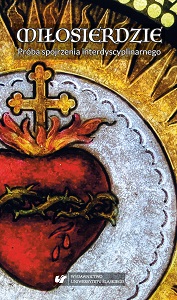Boże miłosierdzie i jego (nie)ograniczoność w świetle Koranu
Mercy of God and its (un)limitedness in the light of the Koran
Author(s): Bożena Prochwicz‑Studnicka
Subject(s): Theology and Religion
Published by: Wydawnictwo Uniwersytetu Śląskiego
Keywords: mercy; the Qur’an; the relation of God and man; linguistic picture of the world;Islam;
Summary/Abstract: The article concerns mercy of God in the light of the Koran. It aims to reconstruct the Koranic understanding of the concept of mercy with special emphasis on its (un) limitedness. Semantic structure analysis of the Arabic word “mercy” (rahma) in the Koranic uses has been conducted as well as the impact of historical‑cultural context on the word meaning was taken into account. A diachronic approach to the Koranic suras was applied. According to the research God’s mercy in the Koran (particularly in the suras from the Meccan period) is of universal character. The humankind as a whole can benefit from it. It manifests itself through God’s kindness, benevolence, favors (for example it is seen in provision of life’s requirements, in revelation – in sending messengers and His giving of Scriptures). Those who believe in Him are treated with special generosity and care. Additionally, thanks to God’s mercy people are able to experience salvation during their earthly life as well as His readiness to forgive them and admit them to paradise. However, this aspect of God’s mercy is applicable only to believers, i.e. to those who believe in one God and His messenger – Muhammad. Unbelievers (according the Koran the pagan Arabs and the majority of Jews and Christians) are excluded from it. They will be condemned to eternal damnation. Such concept of God’s mercy is characteristic particularly for the suras of the Medinan period. On account of the Koranic concept of God’s nature and His relation to humans divine mercy is devoid of the affectionate intimacy, the tenderness and the responsibility.The article concerns mercy of God in the light of the Koran. It aims to reconstruct the Koranic understanding of the concept of mercy with special emphasis on its (un) limitedness. Semantic structure analysis of the Arabic word “mercy” (rahma) in the Koranic uses has been conducted as well as the impact of historical‑ cultural context on the word meaning was taken into account. A diachronic approach to the Koranic suras was applied. According to the research God’s mercy in the Koran (particularly in the suras from the Meccan period) is of universal character. The humankind as a whole can benefit from it. It manifests itself through God’s kindness, benevolence, favors (for example it is seen in provision of life’s requirements, in revelation – in sending messengers and His giving of Scriptures). Those who believe in Him are treated with special generosity and care. Additionally, thanks to God’s mercy people are able to experience salvation during their earthly life as well as His readiness to forgive them and admit them to paradise. However, this aspect of God’s mercy is applicable only to believers, i.e. to those who believe in one God and His messenger – Muhammad. Unbelievers (according the Koran the pagan Arabs and the majority of Jews and Christians) are excluded from it. They will be condemned to eternal damnation. Such concept of God’s mercy is characteristic particularly for the suras of the Medinan period. On account of the Koranic concept of God’s nature and His relation to humans divine mercy is devoid of the affectionate intimacy, the tenderness and the responsibility.
Book: Miłosierdzie. Próba spojrzenia interdyscyplinarnego
- Page Range: 209-228
- Page Count: 20
- Publication Year: 2018
- Language: Polish
- Content File-PDF

